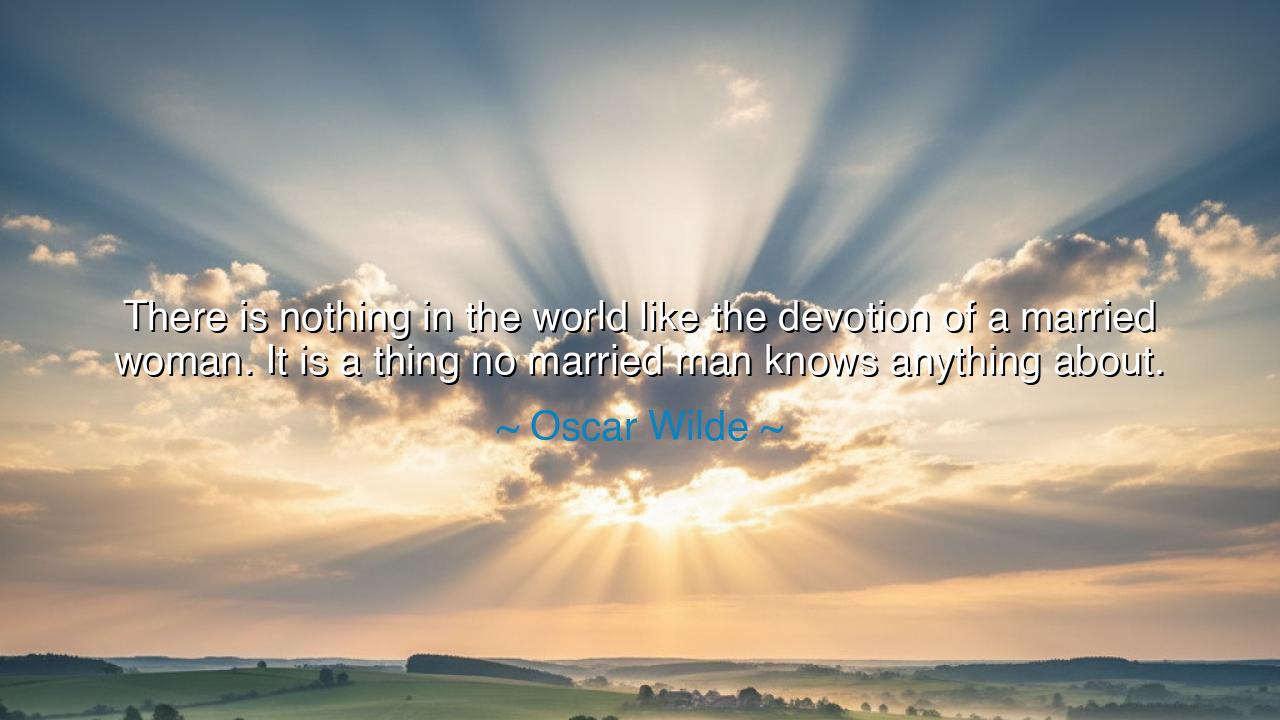
There is nothing in the world like the devotion of a married
There is nothing in the world like the devotion of a married woman. It is a thing no married man knows anything about.






“There is nothing in the world like the devotion of a married woman. It is a thing no married man knows anything about.” Thus spoke Oscar Wilde, the poet of paradox, the philosopher of laughter and lament. In this sharp and shimmering statement, Wilde captures both the beauty and the tragedy of devotion—that holy fire which burns brightest in the heart of a woman bound by love, yet so often unseen by the very one for whom it burns. His words, though cloaked in wit, reveal a deep and timeless truth about the mystery of the human heart: that love, in its purest form, gives more than it receives, and that such devotion, when unreciprocated, becomes both a blessing and a burden.
To understand the origin of this quote, one must know the man who spoke it. Oscar Wilde, born in the latter half of the nineteenth century, lived in an age of manners and masks. He saw the world with the eyes of a poet, yet suffered beneath its hypocrisies. His wit was his armor; his irony, his weapon. When he spoke of marriage, he did so not as a cynic alone, but as a lover betrayed by illusion. In the gilded drawing rooms of London, he had seen countless unions built not on love, but on duty, appearance, and convenience. Yet he had also witnessed the silent strength of women—wives who remained loyal to men who no longer cherished them, who endured in love even when love was no longer returned. To him, this devotion was almost divine in its purity, but also tragic in its loneliness.
“There is nothing in the world like the devotion of a married woman,” he says—and indeed, history itself bears witness to that truth. Think of Penelope, wife of Odysseus, who for twenty years remained faithful to her husband as he wandered across seas and through temptations. Though surrounded by suitors, she wove by day and unwove by night, delaying all proposals until her beloved returned. Her love was not passion alone, but patience, endurance, and faith. Yet even Odysseus, upon his return, scarcely grasped the magnitude of her constancy. He rejoiced in reclaiming his home and throne, but did he ever truly fathom the depth of the woman who had preserved them both? So too Wilde suggests: that the married man, preoccupied with his own trials, seldom comprehends the quiet, steadfast flame of his wife’s devotion.
In Wilde’s time, marriage was both sacred and suffocating. Women were taught that their highest virtue lay in loyalty, even when their husbands strayed or grew indifferent. They were expected to forgive without condition, to endure without complaint. Wilde, ever the observer of irony, saw the imbalance: how a woman’s love could remain fierce and faithful even when unappreciated, while a man’s affection, though sincere, often waned when tested by monotony or disappointment. His words are thus a mirror held up to society’s hypocrisy, but also to the nature of love itself—its capacity to give beyond reason, and to suffer in silence.
Yet Wilde does not mock the devotion of women; he exalts it. He sees in it something noble, something divine, something beyond comprehension. For the devotion of a married woman, in his view, is not a mere affection born of duty—it is the triumph of love over pride, of constancy over change. It is an echo of the eternal, a reflection of the soul’s yearning to give itself wholly, even when unseen or unreturned. It is the same devotion that drives a mother to sacrifice, a sister to protect, a lover to forgive. It is both the strength and the sorrow of the feminine heart.
But his statement also carries a subtle lament—a sorrow for the blindness of men. Wilde implies that the married man, though the recipient of such devotion, remains ignorant of its depth. He may admire his wife’s care, enjoy her companionship, or even love her in his own way—but he rarely perceives the vastness of her emotional sacrifice. Perhaps it is because love, when offered so completely, becomes invisible—it blends with the fabric of daily life until it is felt but not seen, assumed but not understood. Thus, Wilde’s quote becomes not just an observation, but a quiet plea: that men should learn to see, to truly see, the love that sustains them.
So, my listener, let this saying of Oscar Wilde be more than a witticism to amuse the mind; let it be a mirror for the heart. If you are loved, learn to recognize the quiet acts of devotion that surround you—the patience, the endurance, the forgiveness too easily taken for granted. If you love, do so with awareness, not blindness; with gratitude, not assumption. The devotion of a married woman, or of any soul that loves truly, is not owed—it is a gift beyond measure.
And let us remember, finally, the lesson that Wilde’s words whisper across the ages: that love, though mysterious and often unequal, is sanctified when it is seen. To cherish another’s devotion is to honor the divine within them. To return it, in thought and deed, is to make love whole. For while Wilde saw that many men do not know the devotion of their wives, he also implied this truth—that those who do, and who learn to treasure it, find within it not sorrow, but the deepest joy this mortal life can give.






AAdministratorAdministrator
Welcome, honored guests. Please leave a comment, we will respond soon